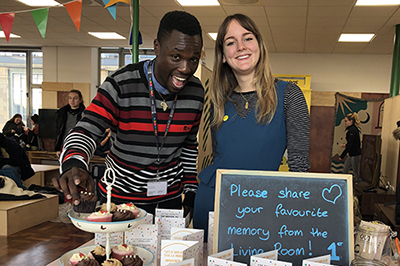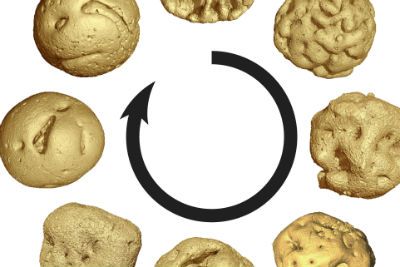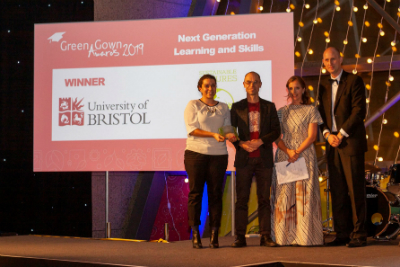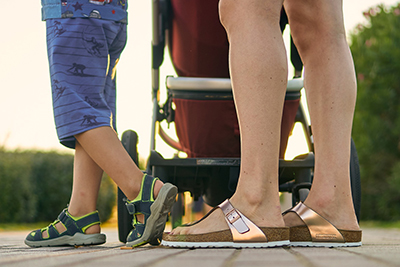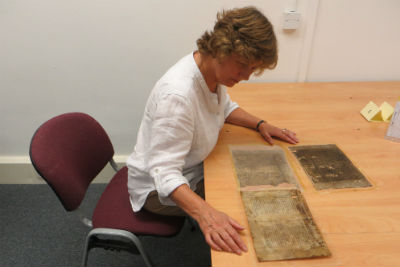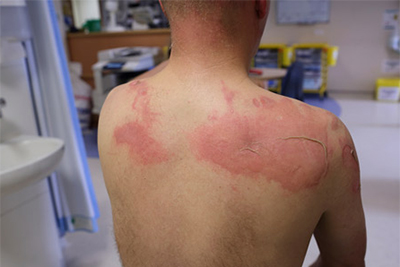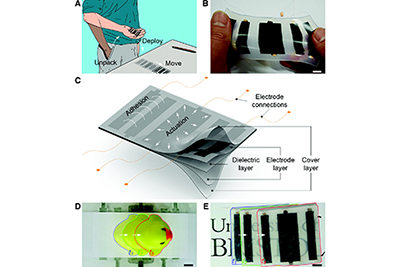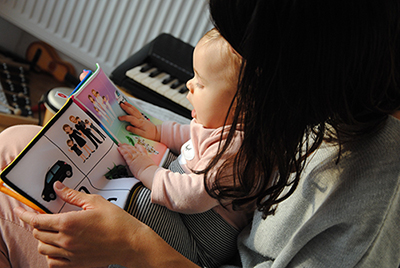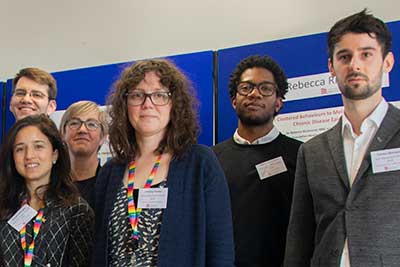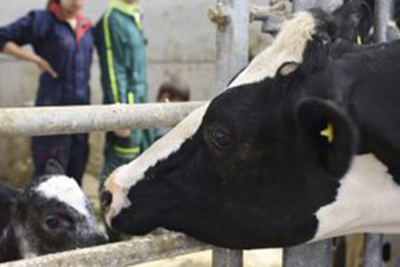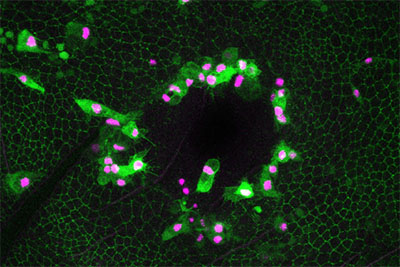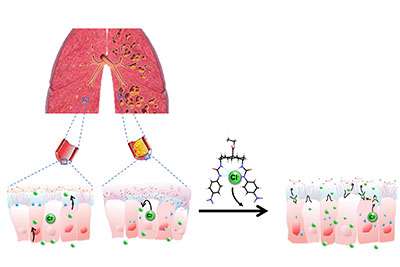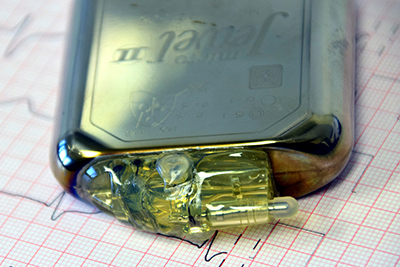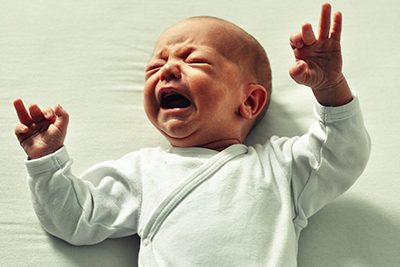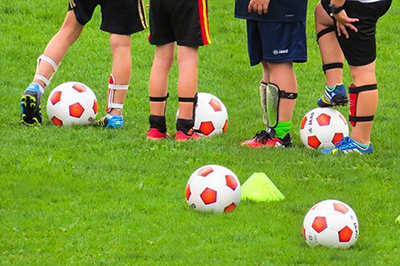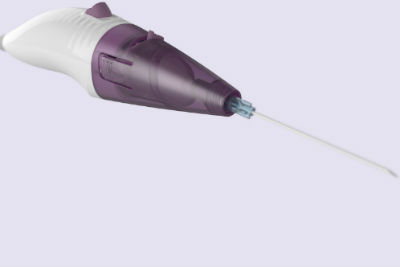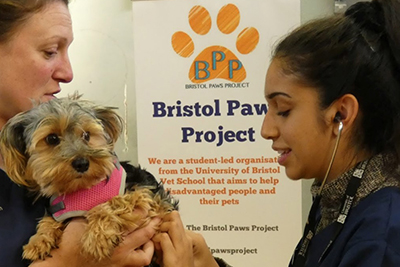Living Room ‘sanctuary’ space for students celebrates first birthday
An innovative social space at the University of Bristol, designed to combat isolation and improve work-life balance for students, celebrated its first birthday today [2 December].
An innovative social space at the University of Bristol, designed to combat isolation and improve work-life balance for students, celebrated its first birthday today [2 December].
Young fish can be drawn to degraded coral reefs by loudspeakers playing the sounds of healthy reefs, according to new research published today [29 November] in Nature Communications.
Two University of Bristol academics have been elevated to Fellows of the world’s largest and most prestigious professional association for the advancement of technology.
A new study by an international team of researchers, led by scientists from the University of Bristol and Nanjing Institute of Geology and Palaeontology, has discovered that animal-like embryos evolved long before the first animals appear in the fossil record.
The University of Bristol’s Sustainable Futures open online course has won this year’s Green Gown Award in the Next Generation Learning and Skills category.
World-leading vaccine scientists from the University of Bristol are working with one of Vietnam's major vaccine manufacturers, Vabiotech, to share cutting-edge knowledge that could help prevent future global outbreaks of avian flu and rabies.
The amount of physiotherapy available following hip and knee replacements comes down to a 'postcode lottery' according to new research led by the University of East Anglia in collaboration with the universities of Bristol and Oxford.
Doctors should avoid co-prescribing benzodiazepines to opioid dependent patients who are being treated with methadone or buprenorphine, also known as opioid agonist treatment (OAT), due to a three-fold increase in risk of overdose death, according to a study led by researchers at the University of Bristol.
Educating parents and grandparents – as well as improving physical activity and the food provided at school – could hold the key to solving China’s obesity pandemic, according to one of the largest trials of childhood obesity prevention in the world.
Children of women who reported domestic violence in pregnancy or during the first six years of the child's life are almost 50 per cent more likely to have a low IQ at age eight, research has found.
New research led by scientists at the University of Bristol has shown that the feedback mechanisms that were thought to keep the marine nitrogen cycle relatively stable over geological time can break down when oxygen levels in the ocean decline significantly.
A University of Bristol spin-out company has raised £1.1 million in funding to develop next generation cell therapies that could open new ways to treat solid tumours and improve the lives of 18 million people worldwide who are diagnosed with cancer each year.
An academic from the University of Bristol has identified a rare medieval manuscript in Dundee City Archives.
The University of Bristol will receive up to £1.1M to research matter and anti-matter as part of a global science experiment that will inform the debate about why the universe survived the Big Bang.
Women who spend longer periods of their early lives in less affluent neighbourhoods are at greater risk of experiencing violence during their early adulthoods at the hands of their intimate partners, finds a new study published in Epidemiology.
New research led by the University of Bristol has found that over half of people would be willing to donate their personal data for research to benefit the wider general public.
Scarring affects over 20 million people in the UK*, according to a new survey released today by The Scar Free Foundation. Yet the findings reveal that scarring is not talked about enough in our society and there is still a lack of public awareness of the physical – as well as emotional – impact that scarring can have on people. One of the most common causes of scarring is burn injury, with 64,000** children seeking medical treatment in the UK alone last year, and yet it is an area of medical research that has been critically underfunded.
Stretchable skin-like robots that can be rolled up and put in your pocket have been developed by a University of Bristol team using a new way of embedding artificial muscles and electrical adhesion into soft materials.
New research examining the effect of being raised by a single mother reveals lower income and resources has the greatest impact on a child’s development, not poor parenting skills.
Marty Reid has been appointed the new Head of Engine Shed, Bristol’s leading enterprise hub. He will take over the role from Nick Sturge in January 2020.
The University’s third cohort of recipients of the Vice-Chancellor’s Fellowships gathered for a welcome lunch yesterday (18 November) with Deputy Vice-Chancellor and Provost Professor Judith Squires and other members of the Executive Team.
Wales will soon be leading the way in promoting best practice prescribing of antimicrobials, thanks to a nationwide project launched today [Monday 18 November] on European Antibiotic Awareness Day and the start of World Antibiotic Awareness Week [18–24 November].
Scientists have discovered a way to manipulate the body’s own immune response to help boost tissue repair. The findings, published in Current Biology today [Monday 18 November], reveal a new network of protective factors to shield cells against damage. This discovery, made by University of Bristol researchers, could significantly benefit patients undergoing surgery by speeding recovery times and lowering the risk of complication.
This year’s Bristol Vision Institute Richard Gregory Memorial Lecture will be given by multi-award-winning visionary designer and storyteller, Alex McDowell, on Thursday 28 November at the University of Bristol’s Wills Memorial Building.
A new treatment for lung disease in cystic fibrosis (CF) for which there remains no cure could potentially benefit all patients, according to a University of Bristol study published in Chemical Science. The findings are an important step towards a new therapy addressing the fundamental cause of cystic fibrosis.
The University of Bristol has committed £800,000 from its Quality Related (QR) Global Challenges Research Fund (GCRF) allocation to support research activities with partners in low and middle income countries.
Using brain circuits made in silicon, scientists have alleviated symptoms of heart failure by reinstating the body's natural heart rhythm. This study published in The Journal of Physiology today [Wednesday 13 November] holds great potential for designing more effective pacemakers in the future.
A review of the evidence on the use of complementary and alternative (CAM) therapies to treat babies with colic has shown some that some treatments - including probiotics, fennel extract and spinal manipulation - do appear to help, but that overall the evidence on the use of these therapies is limited so should be treated with caution.
A new study from the University of Bristol has revealed a dramatic drop in children’s physical activity levels by the time they finish primary school. Between the ages of six and 11, children lost on average more than an hour of exercise in the week, with an even greater fall on weekends.
With a historic Christmas general election on the horizon, the campaign trail is hotting up and election literature is flooding through people’s letterboxes in a desperate bid to win votes.
Professor Elmer Rees CBE, Honorary Visiting Professor and founder of the Heilbronn Institute for Mathematical Research, passed away peacefully on 4 October 2019 after a long period of ill health. His colleague Professor Jon Keating offers this fond remembrance.
Scientists have developed a pioneering new technique that can detect and diagnose one of the most common types of cancer within seconds - using light.
Researchers at the University of Bristol have found evidence of an association between generalised anxiety disorder at age 18 and harmful drinking three years later, thanks to the long-term health study Children of the 90s.
Tours of one of Bristol’s tallest and most iconic buildings have raised a fantastic £38,000 towards caring for sick babies and children in the city.
Armed forces veterans will be offered free legal support thanks to an innovative new scheme from the University of Bristol as part of its commitment to those in the military and their families.
How can the sights and sounds of history be brought alive for modern visitors to National Trust properties? Cutting edge technology could provide an answer, so the conservation charity will work with University experts to create new multi-sensory experiences at some of its places in the South West and Wales.
During Responsible Gambling Week [7 to 13 November], financial services organisations are being called upon to take part in a new programme which looks at how best to help people who are struggling with gambling problems.
A new study published today [Wednesday 6 November] in Psychological Medicine and led by University of Bristol researchers has found that tobacco smoking may increase your risk of developing depression and schizophrenia.
A free vaccination programme for dogs and cats has been organised by a student-led organisation from the Bristol Veterinary School. The Bristol Paws Project, which aims to help owners and pets that may not otherwise be able to afford veterinary treatments, organised a free vaccination drive last month, and the second set of vaccines will be administered tomorrow [Wednesday 6 November].
Some of the world’s leading experts in cyber security have pooled their academic and industry insights to produce an authoritative guide that could help organisations to future proof their resources. The guide, the first of its kind, will also help expand the capabilities of those who will be at the forefront of tackling the challenges of an increasingly connected world.
